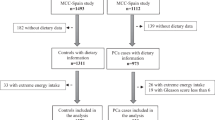Abstract
We interviewed 328 men diagnosed with prostate cancer before the age of 75 years and 328 age-matched population controls. The principal hypotheses were that risk would increase with a high intake of total or saturated fat and would decrease with a high intake of carotene (beta-carotene equivalents) or lycopene. We also examined the associations of other nutrients and foods with risk. There was no evidence for an association between fat intake and risk, although the average fat intake was high and the range of fat intakes was narrow (medians of lower and upper thirds of percentage of energy from fat among controls were 34.3% and 42.9% respectively). Risk was lower in subjects with higher carotene intake: odds ratios 0.65 (95% CI 0.45-0.94) and 0.76 (0.53-1.10) in the middle and upper thirds of carotene intake respectively (P for trend = 0.150). Lycopene was not associated with risk. Among 13 other nutrients examined, the odds ratios in the top third of intake were below 0.8 for: potassium, 0.74 (0.51-1.09; P for trend = 0.054); zinc, 0.73 (0.49-1.08; P for trend = 0.126); iodine, 0.75 (0.51-1.11; P for trend = 0.077); vitamin B6 food only, 0.77 (0.53-1.12; P for trend = 0.077); and vitamin B6 including supplements, 0.70 (0.48-1.03; P for trend = 0.029). Among 18 foods examined, statistically significant associations were observed for: garlic as food, > or = 2/week vs never, 0.56 (0.33-0.93); garlic including supplements, > or = 2/week vs never, 0.60 (0.37-0.96); baked beans, > or = 2/week vs < 1/month, 0.57 (0.34-0.95); and garden peas, > or = 5/week vs < or = 3/month, 0.35 (0.13-0.91). This study does not support the hypothesis that fat increases risk and is equivocal in relation to carotene. The possible relationships of vitamin B6, garlic, beans and peas with risk for prostate cancer should be further investigated.
This is a preview of subscription content, access via your institution
Access options
Subscribe to this journal
Receive 24 print issues and online access
$259.00 per year
only $10.79 per issue
Buy this article
- Purchase on Springer Link
- Instant access to full article PDF
Prices may be subject to local taxes which are calculated during checkout
Similar content being viewed by others
Author information
Authors and Affiliations
Rights and permissions
About this article
Cite this article
Key, T., Silcocks, P., Davey, G. et al. A case-control study of diet and prostate cancer. Br J Cancer 76, 678–687 (1997). https://doi.org/10.1038/bjc.1997.445
Issue Date:
DOI: https://doi.org/10.1038/bjc.1997.445
This article is cited by
-
Zinc supplement use and risk of aggressive prostate cancer: a 30-year follow-up study
European Journal of Epidemiology (2022)
-
Chemical constituents and medicinal properties of Allium species
Molecular and Cellular Biochemistry (2021)
-
Types of garlic and their anticancer and antioxidant activity: a review of the epidemiologic and experimental evidence
European Journal of Nutrition (2021)
-
Processed and raw tomato consumption and risk of prostate cancer: a systematic review and dose–response meta-analysis
Prostate Cancer and Prostatic Diseases (2018)
-
Increased dietary and circulating lycopene are associated with reduced prostate cancer risk: a systematic review and meta-analysis
Prostate Cancer and Prostatic Diseases (2017)


